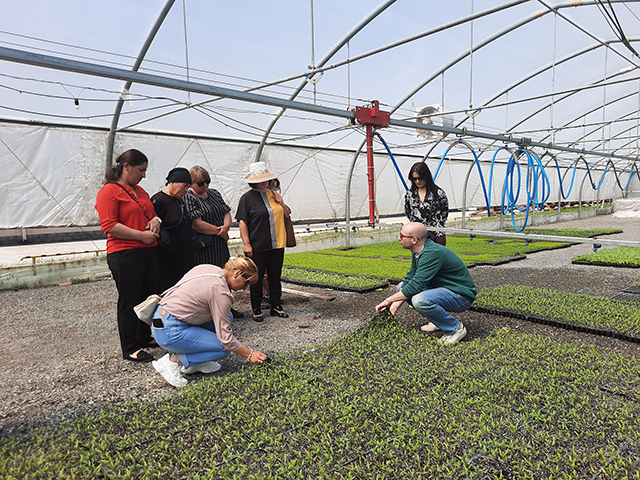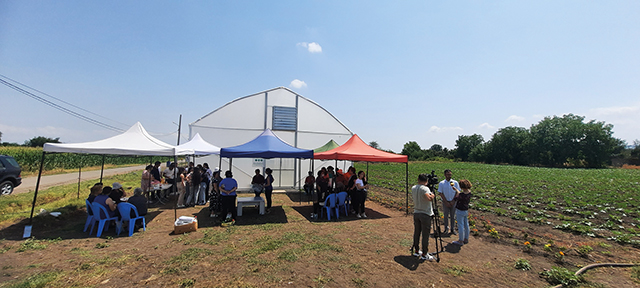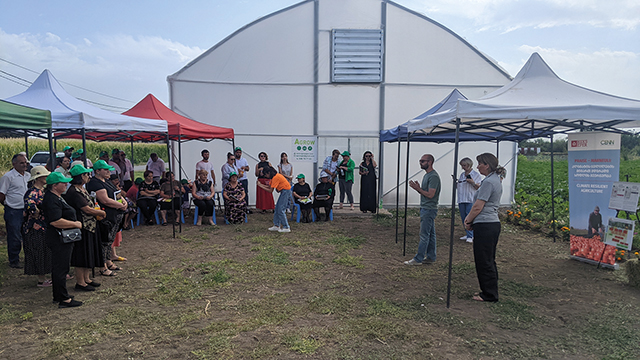Women’s economic empowerment, including for those women living in rural communities, is crucial for Georgia’s sustainable development. Access to education, employment, and entrepreneurship opportunities allows women to earn better livelihoods for themselves and their families.
Economically empowered women are more likely to participate in civic activities and democratic processes.
By helping Georgia’s women in rural areas reach their professional potential, CENN is helping Georgia reach its potential as a resilient, democratic, and prosperous country.
Over the years, through various projects, the organization has provided grants for many locals, thus helping them to implement their business ideas and letting their dreams come true, while socioeconomic integration of vulnerable households is improved by empowering women and youth.

Meaning of Economic Empowerment of Women Living in Rural Communities
Empowerment is the process by which people expand their capacity to make strategic life decisions, especially in contexts where this capacity was previously denied to them.
The combination of family responsibilities and insufficient access to critical services, information and technologies, affects women’s work burden and their potential for income generation. For example, fewer rights over land make it more difficult for women to access subsidies, finance or mechanization.
Globally, and with only a few exceptions, rural and indigenous women fare worse than rural men and urban women and men on every indicator for which data are available. Although they share challenges in the form of rural location and gender-based discrimination, rural women and girls are not a homogeneous group. The opportunities and constraints they face differ across their lifetimes, contexts and circumstances: They are influenced by location and socio-economic status and social identities associated with other forms of marginalization, such as indigenous origin and ethnicity, age, disability and migrant or refugee status.
There is evidence that when rural women have equal access to education, skills development, services, productive inputs and employment opportunities, they are more protected from discrimination and gender-based violence (GBV) and the yields on their farms increase, contributing significantly to economic growth, food security and nutrition. In an enabling environment, they are leaders in their communities and businesses, providing sustainable and innovative solutions to local as well as global challenges.
Rural women continue to have less access to and control over productive resources, technologies, services and opportunities than men. They also tend to lack self-esteem, confidence, negotiation and leadership skills and often have lower education levels than their male counterparts. Many rural and indigenous girls and young women face massive barriers in agricultural labor markets and are restricted to low-status, poorly paid jobs, without legal or social protection or access to essential services and adequate health care. Many continue to face GBV in their homes, communities and workplaces. Gender-discriminatory behaviors and practices are commonly shaped by sociocultural norms regarding the roles played by women and girls, men and boys.
Importance of Economic Empowerment of Rural Women
As farmers and farm workers, horticulturists and market sellers, businesswomen, entrepreneurs and community leaders, they fulfil important roles throughout agrifood value chains, as well as in the management of natural resources such as land and water.
When rural women have access to resources, services and opportunities, they become a driving force against hunger, malnutrition and rural poverty.
Studies show the link between women’s education and the increase in their social status and the reduction of poverty and hunger.
With the right support of rural women, they can be agents of change that can help improve the lives of their families and their communities.
Women are major contributors to agriculture and rural economies, but they face numerous challenges that men do not. They have less access to resources and services, including land, finances, training, and equipment. In addition to their agricultural work, they are overburdened with domestic chores and care tasks.
Despite being productive members of their families, organizations, and communities, rural women are not always able to raise their voices and contribute to the decisions about their household and community issues, money or business, including how their own incomes are spent.
When women are empowered, families, communities and countries benefit.
Links between Poverty & Gender Inequality in Households
Research shows that there is a link between poverty and gender inequality in the family. Improving the status of women contributes to increasing agricultural productivity and fair division of labor, improving child nutrition, since women are more inclined than men to spend their income on food and education.
Improving the status of women has led to greater agricultural productivity and the fairer distribution of labor.
There have been other game-changing development outcomes, such as improved child nutrition, since women are more likely than men to spend their income on food and education.
Empowered women are able to participate more fully in their communities and encourage inclusive local policies that further drive rural development.
Women are actively involved in food systems in a range of roles, from production and processing to retailing and consumption. Women grow and manage crops, tend livestock, work in agribusinesses and food retail, prepare food for their families, and much more. But women’s contributions to food systems are often not formally recognized, and women often face constraints that prevent them from engaging on terms that are equitable and fair. In many countries, women have less schooling than men, control fewer resources, have less decision-making power over household incomes, and face time constraints because of their triple burden of productive, domestic and community responsibilities.

CENN’s Contribution to Empower Rural Women
Empowering rural women is one of the fundamental elements of CENN’s work to reduce rural poverty and improve food security.
CENN, with the financial support of HEKS-EPER, has been implementing the project “Climate Resilient Agriculture – PRAISE Marneuli” since 2021. The overall objective of the project is to support income generation opportunities of vulnerable populations in Marneuli Municipality through the development and promotion of environmentally friendly and climate-resilient agricultural (CRA) practices.
One of the main target groups of the project is women living in rural areas (more than 60% of the direct beneficiaries of the project are women).
By sharing knowledge, technology and experience on climate-resilient agriculture, CENN’s intervention helps rural women produce high-quality food, connect to markets, increase their incomes, become more informed and acquire the necessary skills.
In particular, within the framework of the project, capacity building activities are carried out, such as thematic trainings, field days and study visits. In addition, with the help of the project, a women’s agricultural cooperative “Green Maradisi” was established in Maradisi village of Marneuli municipality, uniting 10 farmers living there, on the basis of which a demonstration greenhouse was organized according to modern standards.
In the greenhouse, cooperative members produce high-quality vegetable crop seedlings using climate-resilient agricultural practices. CENN provides cooperative capacity building: sharing knowledge and technologies on greenhouse management and maintenance, seedling production, facilitating the introduction of profitable services, facilitating linkages with market actors.
To get acquainted with real examples and success stories of the project participants, GEORGIA TODAY spoke to one of its beneficiaries, Naira Bolkvadze, a member of the women’s agricultural cooperative created within the framework of the CENN project. Naira, along with up to 10 more locals, the majority of whom are women, runs a greenhouse in Marneuli municipality, which was equipped with the latest technology irrigation system thanks to CENN.
“‘Climate Resilient Agriculture – PRAISE Marneuli’ significantly helped us to expand production and increase our incomes,” she tells us. “As part of the project, we established a women’s cooperative, the only one in Marneuli. The project helped us to create greenhouse with automatic irrigation systems using modern technologies, and this itself significantly saves resources and the energy of employees. Before that, we had to do everything with our bare hands, which required hard work and time. Now we irrigate greenhouses automatically and are able to grow tens of thousands of seedlings, and our incomes increased almost ten times. Where, before we could grow up to 10,000 seedlings as a result of our physical work, now we grow over 100,000 thanks to the modern irrigation system and well-equipped greenhouse, for which we’re very thankful to CENN. Previously, we could only dream about all this.”
The number of project beneficiaries is expected to increase in the near future, as CENN has recently announced a grant competition for small-scale farmers.
“We’re so satisfied and happy with our cooperation with CENN that we’ve disseminated information about the new grants program to the whole village, to let others also enjoy its benefits and help local women obtain the skills they need for their economic empowerment and social and career advancement,” Naira says.
Sopiko Babalashvili, CENN project representative, notes that the reason why Marneuli was chosen as a target location for the implementation of the project was that it is one of the leading municipalities in terms of production of agricultural products, especially vegetable crops.
“Therefore, we decided to develop an intervention plan that would help farmers living in Marneuli to adapt to the changed climatic conditions and production systems (increased droughts, reduced annual water resources, soil degradation, spread of pests and diseases, reduced rainfall). In addition, Marneuli is a multi-ethnic municipality and through the project we wanted to deepen the cooperation between the Georgian, Azerbaijani and Armenian communities living there.
“Regarding women’s economic empowerment, CENN’s activities are based on the theory that economically strong women contribute not only to strengthening their families and increasing their incomes, but also to improving the socio-economic status of the entire community and, in general, to overcoming poverty in rural areas. That is why CENN ensures women’s involvement in all project activities to facilitate women’s access to information, technology and finance, ultimately helping women increase their agricultural productivity and incomes,” she explains.
Sopiko notes that at this stage, the project has more than 120 direct beneficiaries. The project does not only involve the empowerment of farmers, but also the joint work and cooperation of local stakeholders in the implementation of climate-resilient agriculture. Accordingly, the group of beneficiaries includes both farmers and representatives of community institutions (local authorities, community centers, activists), young people, and media representatives.
As a result of the project, she adds, first of all, the beneficiaries have improved access to information on what climate-resilient agriculture means, what practices and technologies climate-resilient agriculture includes, and what steps need to be taken to adapt to climate change. In addition, beneficiaries have access to knowledge that helps improve their agricultural productivity. Also, the project includes a grant component, through which the beneficiaries will have the opportunity to receive a clear financial support for the adaptation of their farming to climate change.
The project will last until 2024. In 2023, one of the main directions will be the financing of such initiatives and projects within the grant component, which will contribute to the introduction of climate resilient agriculture in the Marneuli municipality and thereby improve the quality of life of the local population. In addition, CENN will continue capacity building activities for farmers and local stakeholders (thematic trainings, field days, study visits).
‘’We have high hopes that the project will create many success stories, which will give us the opportunity to continue our work in other municipalities,” CENN project representative explains.
By Ana Dumbadze














